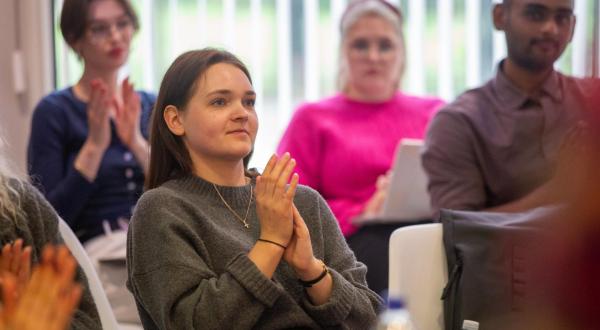Study Explains Latvian Health Care Workers' Attitude towards COVID-19 Vaccination
The attitude of employees of Latvian health care institutions (both doctors and support staff) on the COVID-19 vaccination is in 76.9% of cases accepting and supportive, a survey conducted by researchers from Rīga Stradiņš University (RSU) concludes. Compared to studies from other countries where this figure varies from 27.7% to 80.9%, the Latvian results can be considered high. The survey took place from March to May this year. Researchers from the RSU Faculty of Public Health and Social Welfare and the RSU Psychology Laboratory surveyed 1,444 respondents from various Latvian health care institutions.
The most acceptable attitude of all the study participants was found by doctors – 92.6% indicated that they had been vaccinated or will be vaccinated as soon as possible. When assessing the respondents’ responses according to their level of education, following tendency could be observed: the higher the level of education, the higher the share of accepting attitude. Thus, comparing between education levels, the most acceptable attitude comes from respondents with master's degree or degree of a medical doctor (88.9%) and respondents with doctor's degree (89.4%). The study also found that the most acceptable attitude is from those employees working in Riga and the Riga region, where 84.5% of respondents indicated that their attitude towards vaccination is acceptable. It should be noted that the acceptable attitude is among 90.4% of men and 73.9% of women.
According to Pauls Stradiņš Clinical University Hospital’s Chief Doctor, Associate Professor Eva Strīķe, the attitude towards vaccination in Stradiņš Hospital is similarly related to education. More than 94% of certified medical staff consider vaccination necessary, while among nursing assistants this figure is below 40%.
Our medical staff, who are in contact with infected patients on a daily basis, have been vaccinated for public safety reasons. Assoc. Prof. Strīķe also points out that the crowd immunity in Latvia is currently low, which allows the virus to vary and spread in the form of new mutations, therefore only vaccination can protect against both the Delta variant of the virus and other possible mutations in the future. In addition, as the doctor recalls, ‘recovering from COVID-19 does not yet reduce various health risks, as the clinic is currently experiencing an increase in the number of patients with health problems on a daily basis'.
During the survey, the staff of medical institutions was also asked about, who motivated them or could motivate them to get vaccinated. As the most common reasons are mentioned the widely available, safe and reliable information about vaccines, the opportunity to consult with a competent medical practitioner, a convenient time and place to carry out vaccinations, as well as stories of experience of other vaccinated individuals. In addition, respondents also mentioned such arguments as trust in medicine, safety for oneself and others, and the possibility to avoid serious course of the disease. As further motivating factors respondents mentioned the loosening of restrictions, forming crowd immunity, as well as the specifics of the workplace.
The survey was conducted by Sintija Lielšvāgere-Endele, Scientific Assistant at the Psychology Laboratory, Elīna Puzanova, student of the master’s study programme Nursing, with the participation of the Head of the Psychology Laboratory, Assistant Professor Jeļena Koļesņikova, and the Dean of the Faculty of Public Health and Social Welfare, Professor Inga Millere.
Related news
 18 Student teams to start developing their ideas in B-Space incubation programmeFor RSU Employees, For Students, Innovation, B-Space
18 Student teams to start developing their ideas in B-Space incubation programmeFor RSU Employees, For Students, Innovation, B-Space


